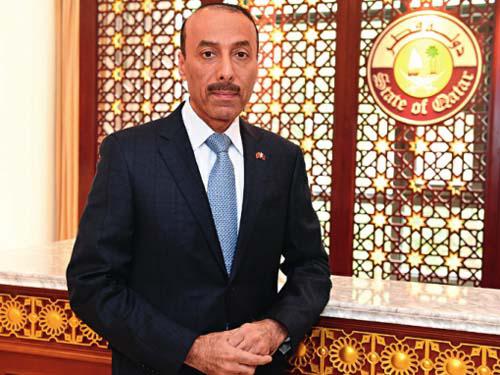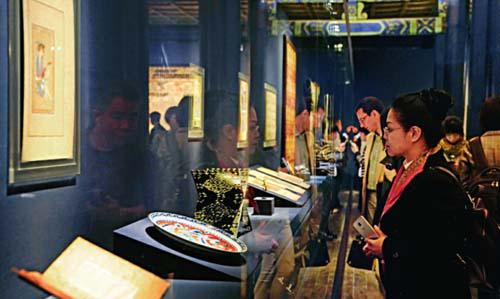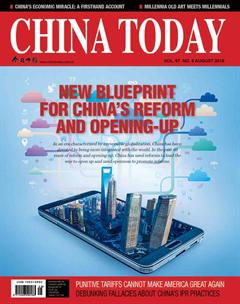Qatar and China:Developing a Comprehensive Strategic Partnership
By staff reporters HAIFA SAID & DU CHAO

SULTAN bin Salmeen Al Mansouri, ambassador of the State of Qatar to the Peoples Republic of China, stressed the deep relations and strong economic ties binding Doha and Beijing, which he said have seen steady and smooth development since their official establishment in 1988, and are witnessing a remarkable boom recently.
In an exclusive interview with China Today on the occasion of the 30th anniversary of the establishment of diplomatic relations, Al-Mansouri shed light on some aspects of the development track of Chinese-Qatari relations over the years, saying that a solid foundation for cementing these relations has been laid as a result of a series of mutual visits and exchanges that have yielded joint cooperation agreements spanning various fields ranging from economy, trade and finance to culture and sports.
The historic visit of the Emir of Qatar, Tamim bin Hamad Al Thani, to China in November 2014, was a crucial point in the course of building these relations, said Al Mansouri.
The visit, he added, produced a clear and complete understanding between the leadership of both countries to further promote bilateral relations. As a result, a strategic partnership agreement was inked, along with the signing of another agreement that saw Qatar joining the efforts aimed at boosting the then newlylaunched Belt and Road Initiative.
Qatars drive to consolidate its relations with China stems from its belief in the necessity of networking Asian countries with strong and solid partnerships, and most importantly, in Chinas increasingly important economic, political, and technological status on the global stage, Al Mansouri pointed out.
Qatar has undoubtedly reaped numerous and plentiful fruits due to its strategic partnership with China, said the ambassador, citing a wide range of cooperation areas that extend from the ongoing export of Qatari gas to China, to joint infrastructure construction projects and Chinese investments in Qatar, and going through constructive and positive exchanges in the education and cultural domains.
“There has been comprehensive development. We have witnessed that since 2014. Now the Chinese people know more about Qatar. Through Hamad International Airport, Qatar Airways has transported Chinese people all over the world onboard its planes, flying to seven destinations in China.”
Al Mansouri took pride in Qatars commitment to providing China with liquefied natural gas (LNG) in the framework of a stable trade relationship that started in 1999.
He elaborated that China is increasingly inclined to reduce dependence on traditional sources of energy, such as coal, as it strives to achieve green sustainable economic development, which makes Qatars supply of natural gas, which is a clean gas, more vital in light of helping China cover its growing needs to diversify energy sources and shift to clean and renewable energy, thus contributing to its sustainable green development.
In this context, Al Mansouri reiterated “Qatars constant readiness to meet Chinas gas needs, even beyond what is agreed upon,” referring also to the ongoing cooperation in the field of exporting petrochemical products to China and Chinese investment in oil exploration in Qatar.
The ambassador pointed out that China is Qatars fourth largest trading partner and second largest importer of Qatari exports. The trade volume between the two countries exceeded US $11 billion in 2017, with US$7.7 billion worth of Chinese exports and US $2 billion in Qatari exports.
Al Mansouri went on to review other areas of economic cooperation with China, saying that there are currently about 180 large and medium-sized Chinese companies operating and investing in Qatar in the fields of infrastructure, technology, communications, education, and finance.
Chief among these companies are China Harbor Engineering Company Ltd., which built and is operating Hamad Port, one of the largest ports in the Middle East, and Huawei Technologies Co. Ltd., which has, together with Qatars leading communications operator (Ooredoo), launched a fifth-generation (5G) network through the 3.5 GHz Spectrum in Qatar, the first in the world to launch the service commercially.
On the other hand, Qatari companies are also engaged in investment business in China under the state-run Qatar Investment Authority, with the investment value estimated at approximately US $15 billion, according to Al Mansouri. These include joint investments with Chinese companies in the sectors of finance, e-commerce, and the Internet, including those with privately owned companies such as Alibaba and Baidu.
In terms of tourism cooperation, Al Mansouri affirmed Qatars desire to attract the travel and leisureloving Chinese to the Qatari tourism market, noting that Qatar has waived entry visa requirements for Chinese citizens, with China joining Qatars list of 80 countries whose citizens can enter the Gulf state visa-free.
“We used to see Chinese travelers only making transfers at Hamad Airport. Now they consider Qatar as a travel destination where they can explore a lot of things, learn about tourist sites, and do shopping in Qatar, among many other activities including sports and cultural events that are held all over the year,” said Al Mansouri.
He stressed that Qatars tourism agencies are exerting efforts to create a Chinese-friendly environment at hotels and other tourism facilities to make it more appealing to the unique taste and culture of Chinese tourists and travelers, including providing services in the Chinese language, tea and specific dishes, which are indispensable for the Chinese people wherever they go.
China, on the other hand, is also a very attractive tourist destination for the Qataris, who mainly head to Shanghai and southern Chinese cities to enjoy the various tourist attractions, said Al Mansouri, expressing his hope that the number of Qatari tourists to China will increase once Chinas entry-visa exemption for Qatari nationals comes into effect later this year.
In his comment on whether there are points of convergence that can be built upon to forge a basis for cooperation between the Qatar National Vision 2030 (QNV 2030) for development and the Belt and Road Initiative, and to link these two projects in a way to set up a unified development strategy to the best interests of both sides, Al Mansouri said QNV 2030 is a very ambitious project aimed at diversifying sources of income for Qatar to reduce dependence on gas and oil, which might run out one day.
“In its concept of development, Qatar Vision 2030 is pretty much in line with the concept of development upheld by the Belt and Road Initiative, primarily in terms of the pursuit of economic, human, social, cultural, and environmental development,” said the ambassador, stressing that there are plenty of promising opportunities to unify development strategies and cement cooperation between the two countries in this framework.
Al Mansouri described the Belt and Road Initiative as “noble,” as its fruits are meant to benefit not just China, but all Asian and other countries along the routes,“therefore, Qatar was one of the first countries to sup-port the initiative out of its belief in the need to back up all efforts that would contribute to the rejuvenation of all countries of Asia.”
Qatar has engaged in all the mechanisms underpinning the foundation of the initiative, and was among the first countries to join the Asian Infrastructure Investment Bank, said Al Mansouri.
One result of the Chinese-Qatari cooperation in this framework, he added, was the establishing in April 2015 of a Renminbi clearing center in Qatar, the first of its kind in the Middle East and North Africa, with the capital of RMB 30 billion.
Al Mansouri described this step as very important as it helps promote trade, encourage investment in the Chinese currency, and facilitate financial transactions between Qatar and China on the one hand, and between the region and the rest of southwestern Asia on the other.
Financial cooperation also included opening branches of Chinese banks in Qatar, such as the Industrial and Commercial Bank of China (ICBC), and the Peoples Bank of China (PBOC), the ambassador said.
China and Qatar are also connected through a network of cooperation lines in various investment and infrastructure projects and other areas. Those include opening the first regular direct shipping route between Hamad Port and Shanghai in 2017, which helps reduce the sailing time and increases the handling volume of containers coming to Qatar from the Far East, Southeast Asia, and Southeast India.
Al Mansouri also described the project of the construction of Lusail Football Stadium as one of the most important Chinese projects in Qatar. The iconic 80,000-seater stadium, which is currently under construction in cooperation with China Railway Construction Corporation Limited (CRCC), is expected to be the largest in the world, and will be used for the opening and final games of the 2022 FIFA World Cup to be held in Qatar.
Commenting on the cultural ties between China and Qatar, Al Mansouri highly lauded the importance and success of the China-Qatar 2016 Year of Culture, during which Chinese arts and silk exhibitions, open-air Chinese festivals, movie weeks, and educational programs were featured, among other activities.
“We sought to bring the Chinese culture to Qatar and help the Qataris who love this culture get closely acquainted with it. We managed to transfer into Qatar various artifacts and valuable treasures of Chinese heritage, including the Chinese terracotta warrior, which the Qataris got to see the real objects for the first time, after knowing them only from images,” Al Mansouri said.
The Qatari ambassador said that in the same year, Qatar organized cultural activities and exhibitions in China, on top being the Pearl Jewelry Exhibition held at Beijing National Museum.
“The year 2016 gave impetus to cultural exchanges between the two sides, which continued in the following years,” said Al Mansouri, referring to the Al Thani Jewelry Exhibition held in the Forbidden City in Beijing that features a dazzling collection of royal pieces from different places of the world, spanning various periods of time.
The Qatari ambassador spoke of academic and educational cooperation binding his country and China, referring to the standing student and academic exchange programs between Qatar University and a number of Chinese universities, including Peking University, and other universities in Shanghai.
He also pointed out to the Peking University-based Qatari-funded chair for Arabic language higher studies, established in 2014, and the ongoing efforts to open a Confucius Institute in Qatar.
The Qatari ambassador took the opportunity through the interview to express his hope and determination to take advantage of the coinciding occurrence of the 30th anniversary of the establishment of China-Qatar diplomatic relations and the 40th anniversary of Chinas reform and opening-up policy to the effect of pushing forward the development of Chinese-Qatari relations and yield more mutually beneficial outcomes.

